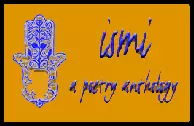Strange, for over a year
you
haven't seen a fly here, even
in the heat of summer.
For sure there're no fish
in the river either but plenty
of gulls dive for old loaves
of break soaked in the water.
You couldn't ever see the
cemetary from here, at least
not till yesterday. Now there are
two at the top of the hill: two
grey cat-paws on the prison wall.
And things are getting clearer.
You cover the bright bulb with
am old sheet of newspaper:
tired from the long wait,
you lie in the shadows
reading headlines.
Finally
you hear the squeal of tires
through the window:
miniature red boxing gloves
hang off the mirror in the lit
up interior
The way out of town is long:
the driver checks the tickets
through his glasses but
drives without them.
A jailbird shoots the breeze with
a cop.
A narrow street with a container
that has CULTURAL CENTER written
on it
lets out onto a square
and nothing surprises you
anymore as you see
an old man trip over a gull
on the sidewalk.
We go over the bridge slowly:
a woman her face red from eczema
puts two small figs into
a straw basket full of apples.
She cranes her neck to look at
the rows of blue buildings in the
fog,
so downhearted that
you know
she'll never
come back.
On the hill above Rajlovac,
you move out of the sun.
Black locusts fill the bare
treetops, and a thousand crows
cover the dry grass: evenings like
this, January, 1990, you know they're
not in the mood anymore: one way
or
another, they've reconciled themselves
to move along quietly and
migrate from Yugoslavia forever
In the café BALKAN, a
local poet holds forth:
What's written in books isn't history,
it's all in the prison archives.
Last time I was here I saw
a famous émigré,
everyone's
writing about him now--what
a tyrant he was. A real gentleman,
who wouldn't be, with that kind
of gold! He sat right here and
drank
and he's in an easychair on the
edge
of a Swiss lake scratching his
cat
and hiccuping from his name
being mentioned so much.
He had two tough dogs, though--
Danes or Dobermans, dark
jaws out to here on them, but
not killers. And before you know
it
they'd be back with his dick
in their teeth, right back
to their master, the guy
everyone feels so sorry for now
A few miles out of Zenica
the bus goes into a sharp curve:
you feel the weight of the girl
in the seat next to you, the warmth
of her shoulder. And you see three
bouquets of roses wrapped in cellophane
held to the cold cement with scotch-tape.
Look, that won't last too long,
I say,
just to make small talk.
And she nods. As if she knows
You look out the window of the
bus:
someone's set some dried shrubs
on fire--
the color of the flame leaps out
of the grey
and brown as kids circle around
with long
sticks transfixed by the blaze
An icy morning at the station--
hot off the press, the newspapers
under your sweater you keep warm
It makes you even colder to look
at those
two as they part with short kisses
frozen in an embrace as their
glasses collide
The woman in a seat near you
is talking to herself:
Fine--she says--all right,
just don't touch
All eyes turn to you
and you also turn to
see who's at fault.
Ashamed,
you turn back,
biting your shoulder
And on the way home:
you go into a café on the
outskirts of town.
Fisherman joke around at the bar
and even though it's your first
time
here, you've already seen it all:
fisherman with yellow boots up
to their hips
and giant bottles of METAXA lined
up
at the bar, so big
you could easily hug them.
Maybe you're someone else,
someone you don't even know.
If you kept thinking about it,
just
the thought would devastate you
You find yourself in the
toilet with
a Sarajevo rocker
Jewish
and while you take
a leak together you bond
in perfect male solidarity:
That's how it is, says the Jewish
guy,
and you nod in agreement even though
it isn't like that
nothing's for sure
except two circumcisions
by the flushing bowl
Without you everything
in this town will still be the
same.
Or almost--you reassure yourself,
like when you use a huge wooden
match to light a cigarette.
So remember a few details,
like the rattling of silver rings,
or your glass bowls.
And all the instances that
mercilessly surround your
AWKWARDNESS: the clash
of teech in a kiss, for instance,
before you recognize the
ghostly ratling of bones
in the silence
that you might have imagined
like your fear of dying in winter
when the laundry freezes on the
line
and the ribs of numb undershirts
crack
translated from the Bosnian
by Ammiel Alcalay
One of Bosnia's most prominent poets and writers,
Semezdin Mehmedinovic was born in Tuzla, Bosnia in 1960 and is the author
of four books. In 1993 he was co-writer and co-director, together with
Benjamin Filipovic, of Mizaldo, one of the first Bosnian films shot during
the war. The film was presented at the Berlin Film Festival in 1994, and
won the first prize at the Mediterranean Festival in Rome the following
year. He, his wife and their child left Bosnia and came to the U.S. as
polical refugees in 1996 and live in Washington, D.C. "Zenica Blues"
appears in Sarajevo Blues (City Lights 1999)
